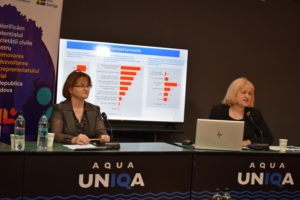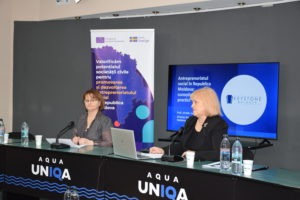Join us on Facebook, Instagram and Twitter, or read one of our blogs. You’ll find the latest news, photos and videos.
Blogs


PRESS RELEASE
20 December 2022
 The concept of social entrepreneurship is not known and fully understood by the population of our country, nor by the officials of state institutions. This is one of the resolutions of the Study “Knowledge, attitudes and behaviors in the field of social entrepreneurship in the Republic of Moldova”, the results of which were presented at a press conference, today in Chisinau.
The concept of social entrepreneurship is not known and fully understood by the population of our country, nor by the officials of state institutions. This is one of the resolutions of the Study “Knowledge, attitudes and behaviors in the field of social entrepreneurship in the Republic of Moldova”, the results of which were presented at a press conference, today in Chisinau.
The study analyzes the knowledge, attitudes and behaviors in the field of social entrepreneurship of the following categories of people: experts in the field, the general population, consumers of the products/services of social enterprises, CSOs not involved in social entrepreneurship activities, but also those involved, representatives of the Enterprises Small and Medium, representatives of LPA level I and II.
According to the results of the Study, more than half of the general population stated that they had not heard of social entrepreneurship, and only one in five mentioned that they could define this notion. At the same time, more than 90% of the general population has a positive attitude towards social enterprises, considering them necessary and beneficial because they help disadvantaged people integrate into society. 2/3 of the respondents would rather buy a product/service from a social enterprise than from a regular enterprise, if the product had good quality and the price – advantageous. And every fifth respondent would like to start a social enterprise in the context where they would benefit from more support from the state.
 The consumers of social enterprise products/services believe that the whole of society benefits as a result of social enterprise activity and that there should be more social enterprises, as they contribute to the employment of disadvantaged people and solve pressing social problems in the community, which are often ignored by authorities.
The consumers of social enterprise products/services believe that the whole of society benefits as a result of social enterprise activity and that there should be more social enterprises, as they contribute to the employment of disadvantaged people and solve pressing social problems in the community, which are often ignored by authorities.
Social enterprises bring ”value to society” and contribute to “the development of the society”, according to the majority of respondents from the ranks of NGOs not involved in social entrepreneurship activities. More than 2/3 of them frequently purchase products from social entrepreneurs and are interested in developing a social enterprise in particular in social and education fields.
“This purchase contributes to the community inclusion of a disadvantaged person” – representatives of CSOs involved in the social entrepreneurship activities stated that this text should be indicated on the product label to increase the interest of buyers. They chose the field of social entrepreneurship because: they obtain an additional source of income to develop the activity of the CSO, they ensure the continuity of their projects by employing vulnerable people who were initially beneficiaries of the CSO, they obtain access to funding sources external, they want to make a change in society. In their opinion, a sustainable public-private partnership would contribute to the development of social businesses.
The analysis of the answers of the representatives of Small and Medium Enterprises discovered the following fact – the bigger the enterprise, the less the representatives know about social entrepreneurship. But they have a positive attitude regarding the employment of people with medium disabilities; they believe that a team in which such people work has a higher morale and a more relaxed approach to the difficulties that arise in the work process, but also in life.
The concept of social entrepreneurship is poorly known by LPA representatives, as most of them cannot define it. The level of collaboration between LPAs and social entrepreneurs is quite low – ⅔ of LPA representatives do not know any social entrepreneurs. Also, LPA representatives do not have information about public policies, fiscal policies or the regulatory framework in the field of social entrepreneurship.
Experts in the field of social entrepreneurship pointed out the aspects that make the activity of social enterprises difficult: gaps in the legislation in the field, weak and insufficient media coverage, unattractive public/fiscal policies, the impossibility of social enterprises to contract loans from banking institutions, etc. The experts mentioned the importance of promoting the concept of social responsibility among Small and Medium Enterprises, including through the development of partnerships.
The essential finding following the analysis of the reference normative framework is that in the context of the lack of clear mechanisms for regulating social entrepreneurship and support from the state, the motivation for the development of social businesses is quite low. Obtaining the status of a social and insertion enterprise does not offer a customized approach from the state arising from the purpose that such a business promotes. A customized approach would mean preferential conditions when awarding public procurement contracts, tax exemptions, facilitation of administrative procedures (such as those for changing the status), consultancy and mentoring in the management of such businesses.
The research is comprehensive and was carried out on a sample of 1142 general population, 109 consumers of social enterprises, 106 CSOs not involved in social entrepreneurship, 109 representatives of small and medium enterprises, 105 representatives of public authorities.
You can find the entire study here: https://www.keystonemoldova.md/ro/publications-and-resources/publications/
The study was carried out as part of the project “Using the potential of civil society for the promotion and development of social entrepreneurship in the Republic of Moldova”, implemented by the East European Foundation in partnership with the Contact Center and Keystone Moldova. The project is financed by the European Union and co-financed by Sweden. The project contributes to the creation of an ecosystem favorable to the development of social entrepreneurship in the Republic of Moldova.

Join us on Facebook, Instagram and Twitter, or read one of our blogs. You’ll find the latest news, photos and videos.
Blogs